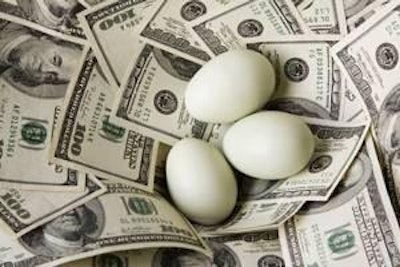
“We believe that sustainable living is for everyone, no matter who they are or how much they earn. Our business is committed to bring great value at everyday low prices. For us, sustainability is part of that value,” said Dr. Chris Brown, vice president and director of ethical and sustainable sourcing at Asda, Wal-Mart’s subsidiary in the United Kingdom. Brown spoke at the International Egg Commission’s conference in London and told the delegates that Asda believes in everyday low prices for sustainable products.
Consumers want green
Brown shared the results of a survey that Asda conducted with 6,000 consumers. In this survey, consumers of all age groups said that they care about being “green.” Older consumers report that they care as much, if not more, about being green than do consumers in the 20-29 age group. Customers participating in the survey said that Asda should listen to them when considering environmental issues, even more so than “green experts.” Customers said that green products should be easier to find in the store. When asked their reason for being green, most consumers say it is “the right thing to do” and “that they care about the environment.”
Brown said that Asda’s core customers are, on average, younger than the population as a whole; 77 percent are in the 25-44 age group. He said that 79 percent of their customers are female, and they tend to have lower incomes; 58 percent have an annual household income under $47,640 (£30,000). He also said that Asda consumers are more likely to think that their financial status has gotten worse recently than the average for the country. On average, British consumers have $12.70 (£8) per week less disposable income than they did in July 2010.
Efficiency part of sustainability
Brown said that Asda sees economic efficiency as a big part of sustainability; this could be because their core customers have to make do with less disposable income. He said that Asda has saved over $127 million (£80 million) with its sustainability measures since 2005.
Energy efficiency saved $63.5 million (£40 million), reductions in product packaging saved $15.9 million (£10 million), supply chain transport efficiency saved approximately $12.2 million (£7.7 million), and recycling has reduced waste cost by $44 million (£27.7 million).
Brown said that these savings will become even more important in the future because energy prices are expected to double by 2020, resources will become scarcer, and fees and taxes for disposal of solid waste will increase. All of these drivers of higher prices will mean that sustainable suppliers will have a competitive edge, according to Brown.
“We’ve worked very hard to reduce our environmental impacts and, as a result, our costs,” Brown said. “We’re listening to what our customers care about, and they want us to help them lead greener lives. We are now using the lens of sustainability to ensure future low prices.”
Successes to date for Asda include moving towards zero-waste stores, industry-leading transportation efficiency and slimming down packaging. Almost 96 percent of waste is diverted from the landfill, and 100 percent of food waste is diverted. Two hundred Asda stores are at zero waste. They have reduced packaging 27 percent by weight and reduced transportation emissions by 42 percent.
“Sustainable living is for everyone, no matter who they are or what they earn,” Brown said. “We’ve busted five big myths about who cares when it comes to sustainability.” He added that green is normal; the consumer sets the sustainability agenda. We can be even greener in the future, and the green choice doesn’t have to cost more.
Challenge for animal agriculture
Brown said that the egg industry has a great sustainability story to tell because of feed efficiency, but that it needs to continue. The industry has to continue to improve. He also said that there are public health concerns about the use of growth-promoting compounds, which could be a benefit to egg producers since they generally don’t use any. At points in his presentation, Brown addressed greenhouse gas emissions and efforts to reduce these. At the present time, greenhouse gas emissions are an issue in the United Kingdom, but there are no regulations in place in the US. He said that livestock products will be under more pressure in the future because of the large amount of resources required to raise animals and the increased competition for these resources.
Brown challenged food producers to stay up with consumer trends and eating habits. He cited a trend away from the traditional three square meals per day and towards lighter meals with snacking in between, including a trend towards snacking and eating meals in front of the computer at work, which he referred to as eating “al desko.”
Brown stressed that in his opinion, “Green is not a passing fad.”

















